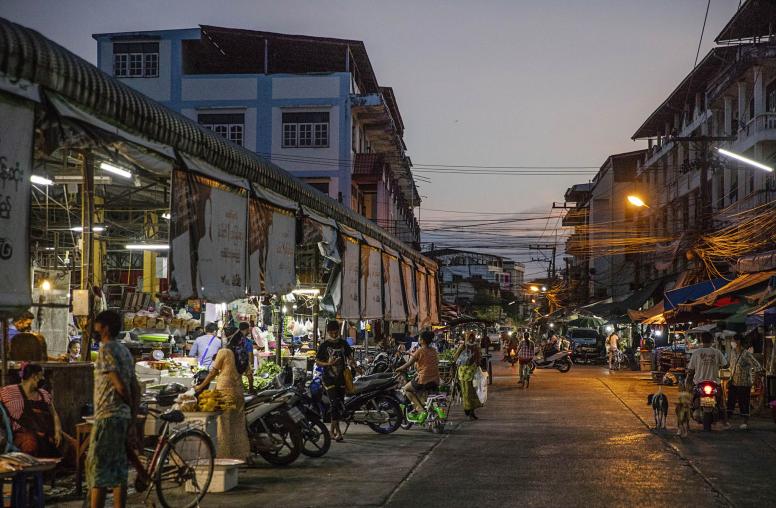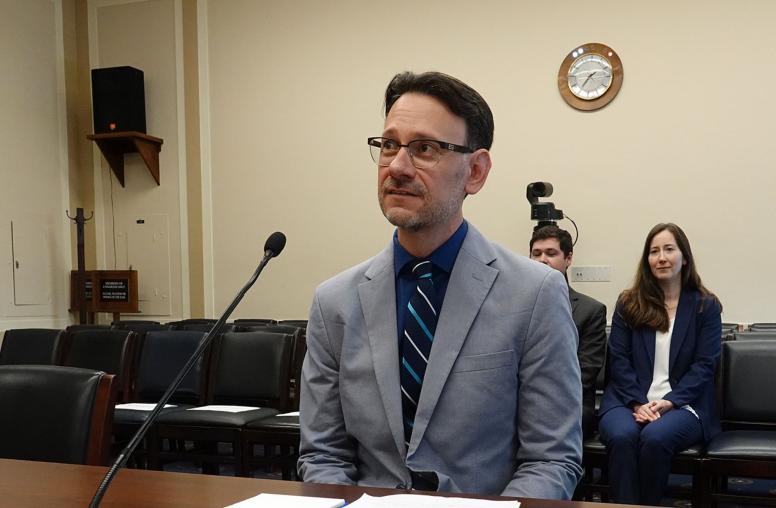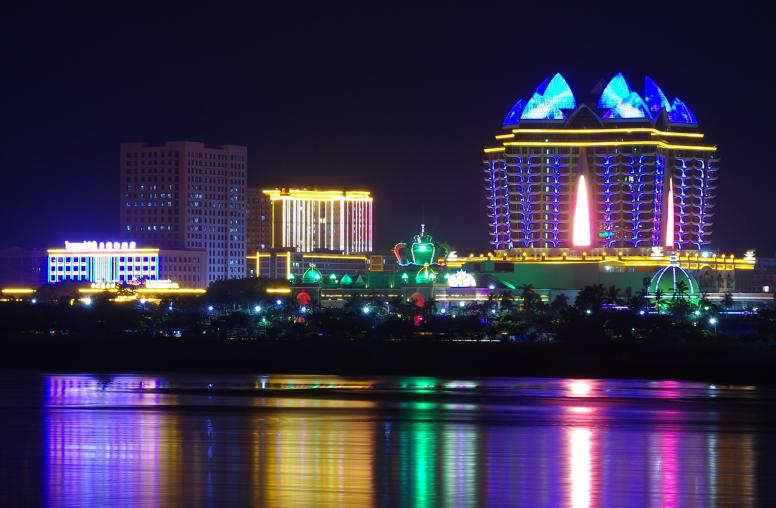How Small States Navigate U.S.-China Rivalry: The Case of Cambodia
Amid major power competition, Cambodia is preserving its strategic autonomy through ‘smart and flexible diplomacy.’
Editor’s Note: The following article is part of a new USIP essay series, “Southeast Asia in a World of Strategic Competition.” The opinions expressed in these essays are solely those of the authors and do not represent USIP, or any organization or government.
Amid growing distrust and an intensifying systemic rivalry, U.S.-China relations are at the lowest point in decades. In Washington, the last three U.S. administrations have sought to balance, challenge and counter China’s rises in Asia. In Beijing, revisionist leader Xi Jinping’s regime has an ambitious plan for “national rejuvenation” and views the United States as the major strategic threat to China’s ambitions. Countries like Cambodia are caught in between.

On the one hand, China’s receptiveness to Cambodia’s desire for political stability and economic development could enhance the domestic political standing of the regime in Phnom Penh and its strategic autonomy. On the other, Cambodia needs the United States and its allies for export destinations and to counterbalance against an over-reliance on any particular country, including China, despite disagreement between Phnom Penh and Washington on the ruling party’s treatment of dissent and domestic political arrangements.
Sino-American Rivalry and Strategic Implications for Cambodia
It is undeniable that, as a small state, Cambodia has less room to maneuver amid today’s unprecedented geopolitical competition and dynamic regional order. Still, the principles of non-interference, permanent neutrality, non-alignment, peaceful coexistence with neighbors, territorial integrity and national sovereignty, as enshrined in Article 53 of Cambodian constitution, continue to serve as a roadmap for Cambodia’s foreign policy direction.
After Xi’s state visit to Phnom Penh in 2016, Cambodia’s relations with China and the United States changed dramatically. Ceasing all military exercises with the United States in the 11th hour of the Obama administration, Cambodia inaugurated the “Dragon Gold” joint military exercise with China in December 2016. They repeated and expanded the exercise in 2018, 2019, 2020 and 2023. At the same time, U.S.-Cambodian ties began to decline. In addition to the absence of military exercises, the United States was implicated in a treason case against Cambodian opposition leader Kem Sokha, whose Cambodia National Rescue Party was disbanded.
Since June 2022, when Cambodia began the structural overhaul of its Ream Naval Base, U.S.-Cambodia relations have become even more difficult. The razing of U.S.-built facilities at the base to make way for the upgrade, an unsuccessful visit by the U.S. defense attaché, sanctions against Cambodian officials directly involved in the project, and a cut off of U.S. military education for Cambodian officers are some of the most prominent indications of deteriorating relations before 2022, particularly in regard to the defense relationship.
But during Cambodia’s 2022 chairmanship of the Association of Southeast Asian Nations (ASEAN), there was an opportunity for improvement in U.S.-Cambodia ties. The Biden administration’s support was critical to Cambodia’s successful leadership of the regional grouping amid tumultuous years of global insecurity. As a result, the first U.S.-ASEAN Special Summit was held in Washington. Furthermore, leading Biden administration officials, including the president, Secretary of State Antony Blinken, Secretary of Defense Lloyd Austin and Trade Representative Katherine Tai all visited Cambodia to attend different ASEAN-led meetings. In addition to his trip to Washington for the ASEAN summit, Prime Minister Hun Sen made a rare visit to the U.S. embassy compound in Phnom Penh at the end of 2022 in a bid to improve relations.
At the same time, Cambodia’s economy became less dependent on China during the pandemic. China’s share in Cambodia’s public debt decreased from 47.48% at the end of 2019 to 40.13% at the end of 2022 and 38.72% by the end of the first quarter of 2023. Besides large-scale infrastructure investments, there have been fewer economic engagements between Beijing and Phnom Penh due to the absence of Chinese tourism as a result of Beijing’s extensive zero-COVID policy and subsequent chaotic struggle to exit from that policy and make a post-pandemic recovery.
This year, Cambodian respondents to ISEAS-Yusof Ishak Institute’s annual state of Southeast Asia survey viewed the United States positively. Three-fourths were either “confident” or “very confident” when asked if the United States could be “a strategic partner and provider of regional security” and 73.1% said that "if ASEAN were forced to align itself with one of the two strategic rivals” it should choose the United States, with only 26.9% choosing China. This is a major reverse from the 2022 survey, where 81.5% chose China and only 18.5% chose the United States.
After Cambodia’s ASEAN chairmanship ended, Phnom Penh turned to focusing on its domestic affairs. With national elections and political succession looming large in early 2023, Cambodia began revitalizing ties with China and distancing itself from the United States. After over four and a half decades in office, the pioneering generation of the Cambodian People’s Party staged a once-in-a-lifetime dynastic transfer of powers to their immediate heirs. The new prime minister, Hun Manet, is the son of Hun Sen, who served as premier from 1985 until this year. Hun Manet traveled to Beijing just last week to strengthen ties with China. But this week, he is in the United States to attend the U.N. General Assembly and the Cambodia-U.S. Business Forum in bid to woo more American investment.
Insecure about what has been described as the Western efforts to seek regime change through “color revolution,” Phnom Penh may have perceived that U.S. engagement would weaken the central power of the ruling party in the long run. A major redline for Cambodia is interference in its internal affairs, and the perception that Washington intends to do so continues to challenge bilateral ties and dilute political trust. For their part, Western governments cited Cambodia’s own constitution, the Paris Peace Agreement and international treaties ratified by Cambodia involving civic and political rights as the basis of their criticism of Cambodia’s politics.
Cambodia’s Agency and Options
Some scholars argue that Cambodia is pursuing a “comprehensive bandwagoning” strategy toward China. This refers to small states’ attempts to “align with one bigger power in all dimensions — military, economic, political, and diplomatic — but does not aim at a particular power and does not completely distance itself from another bigger power.” While this argument does seem to illustrate the overall picture of Cambodia’s strategy toward China in a nutshell, it does not fully describe the country’s foreign policy direction. In other words, Cambodia’s strategy does not merely revolve around major power competition.
Cambodia sees China’s rise as peaceful and does not see potential threats emanating from its giant neighbor, as opposed to some other ASEAN countries like Vietnam and the Philippines, where South China Sea issues remain a critical security dilemma. Cambodia has benefited economically from various Chinese initiatives and regional frameworks that enable the country to enhance its socio-economic development.
The United States and its allies, however, continue to view Cambodia through the lens of competition with China. Given its geographic location and regional role, Cambodia is often perceived as the center of strategic competition between the two superpowers.
Nevertheless, many observers perceive the country’s strategy as “playing safe and low-profile diplomacy” by refraining from getting involved in internationally sensitive issues, particularly those that may obstruct or hinder the core interest of major powers. Analysts also see Cambodia utilizing “smart and flexible diplomacy” in order to benefit from all major and middle powers as core development partners contributing toward further national economic development.
Arguably, Cambodia’s agency and strategic autonomy can be seen as largely dictated by its statesman. Former Prime Minster Hun Sen proclaimed that if the United States continues to reject Cambodia’s explanation behind the Chinese overhaul of the Ream Naval Base that Phnom Penh would not accept Western rationales for the nuclear submarine alliance known as AUKUS. “I think this is the starting point, if not the danger to ASEAN, it is the starting point of the arms race in the region,” he said. Hun Sen has often called for major powers to not just consider Cambodia a lone state, but as a member of ASEAN, an institution with consensus-based leverage.
Cambodia also has agency in regard to principle-based and institutional frameworks. For instance, in 2017, Cambodia was the first ASEAN country to openly support Japan’s Free and Open Indo-Pacific (FOIP) framework, even though it might hurt “China’s feelings and geostrategic interests.” Cambodia’s position toward the Russia-Ukraine war is a high-profile example of how it strongly abides by the rules-based international order. Despite the regime’s deeply rooted historical ties with the Soviet Union during the 1980s, Hun Sen co-sponsored a U.N. resolution in March 2022 to condemn Russia’s invasion of Ukraine. This bold move was not well received by all of Cambodia’s friends, but demonstrates that rules-based principles and international law can shield small states from larger neighbors. This resonates in Cambodia, which strongly opposes foreign intervention, violations of territorial sovereignty and coercion in all forms.
Another angle that is often overlooked is the diversification strategy of Cambodia toward middle powers, most recently with the Global South. Former Foreign Minister Prak Sokhonn’s official visits to Morocco and Egypt in March 2023 signified the country’s effort to maneuver and seek additional options beyond existing partnerships, and to relieve some pressure from major powers.
Albeit small, Cambodia is not without agency, which plays out in three ways. First, its strategic autonomy is largely dictated by its statesmen, who shapes the country’s foreign policy agenda and direction. Second, its adherence to principle-based and institutional frameworks is a pathway toward navigating sensitive and critical issues. Last but not least, its diversification strategy with middle powers and the Global South, which provides additional strategic options and more room to maneuver in this highly unprecedented geostrategic environment.
Charadine Pich is a deputy executive director of the Cambodian Institute for Cooperation and Peace, the oldest foreign policy think tank based in Phnom Penh.
Chhengpor Aun is a non-resident research fellow at Future Forum, a Cambodian think tank.



